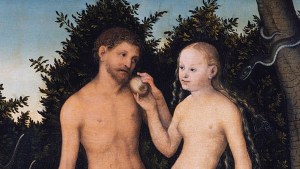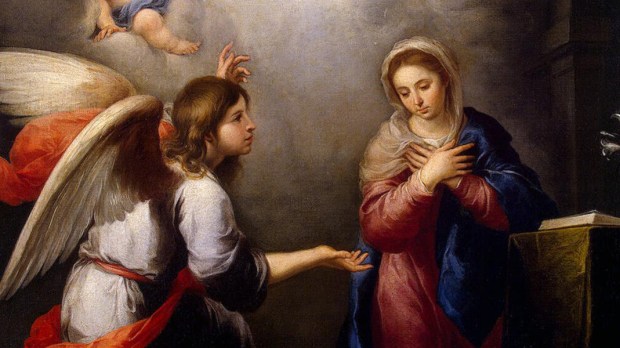Out of that great and terrible wreck, in which human reason lost its chief possessions, and especially the Truth for which God had formed it, the mind of man has retained a vague and uneasy desire to recover some vestiges of that truth.” – Bishop Jacques-Bénigne Bossuet
When our first parents fell from the state of harmony in which God had created them, the universe was ruptured, seemingly irreparably. By the first sin, they traded closeness to God for loneliness, creatureliness for apparent mastery, harmony for brokenness. Rejecting the Truth, they declared themselves authors of their own truth. What could save them? What could restore the love and peace they had once known?

Read more:
Was Adam really dumbstruck by a silly little talking snake?
Just as all is lost, just as the darkest night seems furthest from dawn, a spark glimmers on the horizon. She is there. She stands at the edge of the world, becoming a new point where the light of heaven converges on earth.
The angel said to her, “The Holy Spirit will come upon you, and the power of the Most High will overshadow you; therefore the child to be born will be called holy, the Son of God. And behold, your kinswoman Elizabeth in her old age has also conceived a son; and this is the sixth month with her who was called barren. For with God nothing will be impossible.” And Mary said, “Behold, I am the handmaid of the Lord; let it be done to me according to your word.” (Luke 1:34-38).
An entire and perfect reversal of fortune transpires. While Eve was drawn from the side of Adam, the New Adam springs forth from this New Eve. When once a free choice rejected the designs of heaven, a new “fiat” claims the Creator’s plan as humanity’s own. Before a woman was proud, now there is a lowly handmaid. As Vincent McNabb, O.P. puts it, “At that moment she lifted herself in stature beyond the stars, and, plucking God’s golden fruit, gave it to men to eat.”
Mary’s graced “yes”—the proclamation “let it be done,” fiat!—is echoed in every vocational assent. At baptism, parents are asked whether they wish their child to be baptized. A couple is asked at the altar whether they wish to be married. Seminarians are asked if they wish to be ordained. This is not a passive word. The yes, prompted by the movements of God’s grace, is active. “Yes” is the highest height of freedom; fiat is the free-willing that trumpets symphonic cooperation with the promptings of Providence.
Reaching forth to God, proclaiming consent to his Divine Plan violently protests the domain of sin. God heals our wounded longing for Truth by inspiring us to grasp for him.
In the word spoken at the Annunciation, Providence decrees that Truth, once forgotten, is now known.

Read more:
How the Virgin Mary inspired a group of religious to exchange their lives for prisoners’ freedom

